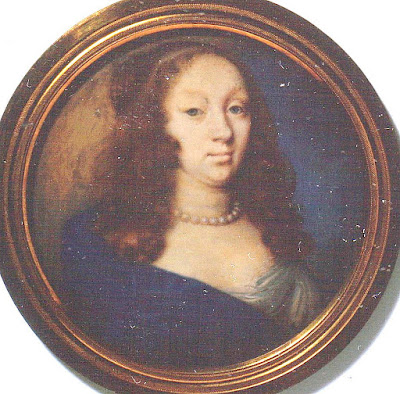Most of Barb's ancestors came from England, though there are some Dutch and French and who knows what-all tossed in there. Maybe she should do one of those DNA tests that breaks it all out - let's see, 40% English, 30% Dutch, 20% French, 10% Heinz 57. Okay, maybe not.
I don't spend a lot of time working with the British ancestors because there's not a lot of information available unless you subscribe to specialized database resources, and even then it's often just Lord so-and-so, 1st Earl of Wishywashy and Dame so-and-so, Countess of Someplace. But occasionally you get lucky and find an interesting story.
Lady Alice (Alicia to her friends) Beconsawe was Barb's 10th great grandmother. The line is quite complete and fairly well documented and we can be fairly certain about this. She was born in 1617 in Hampshire, England, United Kingdom and at age 19 married Lord John Lisle "the Regicide" on 23 Oct 1636 in Ellingham, Hampshire, England. It was a lovely wedding.
By the way, "a regicide" is defined as a person who kills or takes part in killing a king. That's next week's story.
Sir John and Lady Alice had a bunch of little Lords and Ladies, and the first-born, Margaret Lisle, was Barb's 9th great grandmother, and so on. Everything was fine and dandy, apart from the fact that Sir John got himself assassinated in 1664, while hiding out in Switzerland, leaving Alice and a bunch of the kids to fend for themselves. However, since she had inherited the castle, servants and land from her daddy, Alice and the kids didn't have to take in laundry to survive.
On 20 July 1685, a couple of weeks after the Battle of Sedgemoor (the final battle of the Monmouth rebellion - but you knew that, didn't you?), Lady Alice agreed to shelter John Hickes, a well-known Nonconformist minister, at Moyles Court, her residence near Ringwood, in Hampshire. Hickes, who was a member of Monmouth's defeated army, brought with him Richard Nelthorpe,
another supporter of Monmouth and under sentence of "outlawry." The men
spent the night at Moyles Court, and in the morning were arrested. Their
hostess, who had initially denied their presence, was charged with harboring traitors.
Lady Alice's case was tried by Judge George Jeffreys at Winchester. She pleaded she had no knowledge that Hickes's offence
was anything more serious than illegal preaching. Furthermore, she had
known nothing of Nelthorpe. Jeffreys, however, showed no pretense of impartiality, and even though the jury returned a verdict of innocence 3 times, he refused to accept the verdicts and sentenced Alice to be burned at the stake! Jeffreys, a real sweetheart, reportedly said that he would have found her guilty "even if she had been his own mother.".
King James II refused to extend mercy to her, though he allowed beheading as befitted her social rank to be substituted for burning at the stake. Lady Alice Lisle was publicly executed by an axe in Winchester
marketplace on 2 September 1685; the last woman in English history to
be beheaded by judicial sentence. She died with courage and dignity:
onlookers remarked that, perhaps due to her age (80 years), she seemed to leave the
world without regret (some other accounts, however, suggest she was as
prone to napping during the procedure as she had been during her trial).
Next week we'll talk about Sir John "the Regicide" and his daughter, grandma Margaret.
Subscribe to:
Post Comments (Atom)

No comments:
Post a Comment